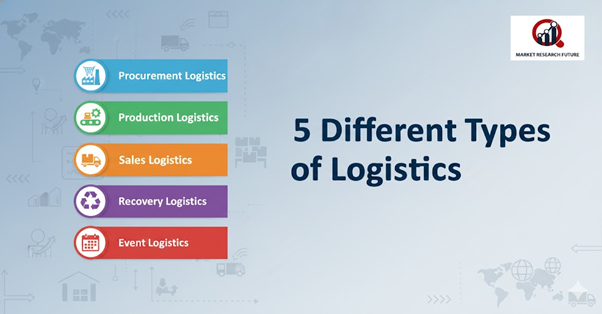Increasing Emphasis on Efficient Supply Chain: A Key Driver for the Logistics Market
Growing Preference for Online Shopping to Spur the Demand for Efficient Logistics

The size of the global logistics market in 2024 was measured at USD 1006.9 billion, which is likely to reach USD 1500 billion by 2035, owing to the growing demand for efficient supply chain management. The progress of the ecosystem is set to occur at a CAGR of 3.69% through the forecast period.
Specifically, logistics means the comprehensive affiliation and accomplishment of a complex activity. In the general marketing sense, logistics is the management of the advancement of things between the source of origin and the source of consumption to meet the necessities of customers and producers.
5 Different Types of Logistics
There are 5 types of logistics associated with the business. They include:
- Inbound Logistics
This type of logistics refers to the internal logistics, purchases and efforts that an organization needs to complete to work. It refers to the strategic plan of a firm that works ambitiously. As far as the supply chain is concerned, it involves the relationship with parties that work further for the growth of the given business.
- Outbound Logistics
Outbound logistics refers to the output and efforts that are connected with moving the item to the end client. Such strategic commitment is applied to the players who work moderately for the long-term and are the last party in the supply chain.
The commitment that is incorporated includes the storage of manufactured stock, the transportation of produced merchandise to the retail location, and sometimes, the shipping and handling that are involved in the process.
- Third-Party Logistics
Third-party logistics can be confusing for entrepreneurs. Logistics combines all the pieces of the supply chain that assist in planning, actualization, and controlling the flow of merchandise and services to meet client preconditions. Third-party logistics signifies that a third-party business is used to outsource logistics services.
These services can be a combination of all the efforts, including the management and different ways an enterprise moves its resources, starting from one location to another, and so on. This involves production, transportation, tasks, warehousing, and others.
- Fourth Party Logistics
A 4PL is a fourth-party logistics supplier, which takes the third-party logistics a step further by managing the infrastructure, innovation, resources, and technology, along with managing the external 3PLs to fabricate, configure, and provide supply chain solutions to the organization.
A 4PL service involves 3PL service along with freight sourcing strategies, logistics strategy, design, network analysis, consultancy, change management, inventory planning, business planning, and project management, besides inbound and outbound logistics management.
- Distribution Logistics
Distribution logistics includes arranging errands, controlling, and all procedures, which might concern the flow of goods and information between the manufacturing companies and the clients. Distribution logistics, also known as transport logistics or sales logistics, is the connection or link between the market and production.
The zone contains all procedures that are engaged with the distribution of merchandise, starting from the manufacturing organizations to the customers. Customers might be the final end-users, distributors, wholesalers, or processors. It ensures that the produced goods and services are reaching the customer safely and quickly.
Regional Analysis
With the growing autonomy in the service industry in the Asia-Pacific region, the dependence on the logistics network and supply chain management has been increasing. This spurs the demand for efficient logistics, proving to be a key driving force for the logistics market.
The growing E-commerce businesses in North America have helped the region lead the global logistics market, upholding opportunities for emerging players in the industry.
Conclusion
Resources managed in logistics companies might combine tangible products, such as hardware, materials, and supplies, just like food and other consumable items.
The logistics of physical things for the most part involve the combination of creation, information flow, stock, material handling, packaging, regular security, warehousing, and transportation.

Leave a Comment